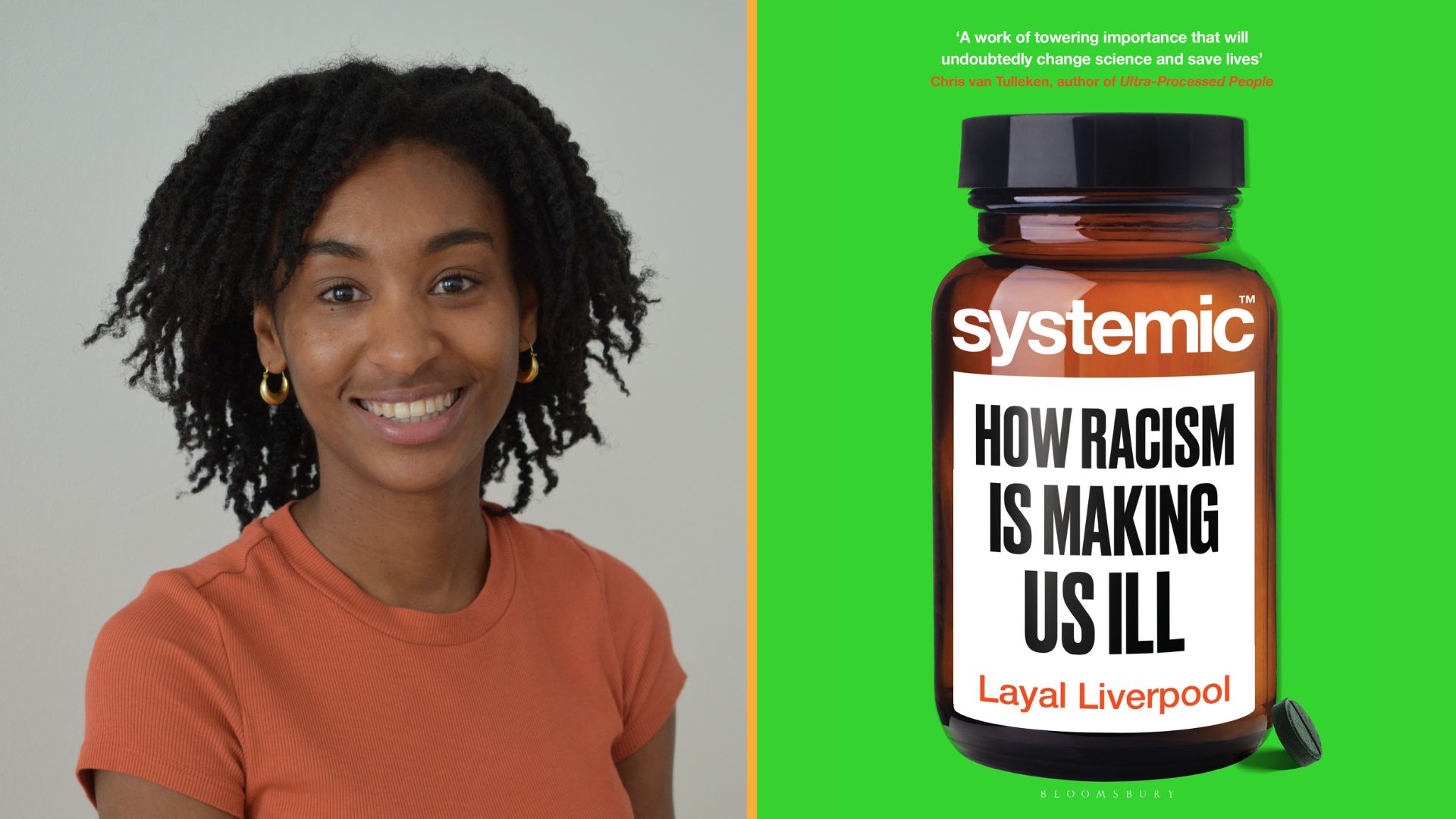
Racism pervades health care systems across the world, putting patients' health and lives at risk. In "Systemic: How Racism is Making Us Ill" (Bloomsbury Circus, 2024), science journalist Layal Liverpool shows how people of all socioeconomic statuses experience racism in health care, as exemplified by the widely covered story of Serena Williams' complications after childbirth, for instance. The book traces the historical legacy of racial inequities in medicine and reveals disturbing trends that still persist in medical education and research.
Liverpool worked in biomedical research at the University of Oxford and University College London, specializing in the study of viruses and the immune system before becoming a journalist.
In "Systemic," she draws from both sides of her expertise to highlight the stories of people who are working to close the pervasive, racialized gaps that persist in health care, education and research.
"I really do think there are reasons for hope — for optimism," Liverpool told Live Science. "I think that by recognizing that racism is behind so much unfairness in health, it means we can begin to tackle the problem."
Live Science spoke with Liverpool about her new book and what she hopes readers will take away from it.
Nicoletta Lanese: It seems like representation in the sciences and health inequalities were major focuses of your journalism from the start — would you say that's true?
Layal Liverpool: I think initially, it was kind of the opposite. Maybe I felt like, "I don't want to be pigeonholed as this Black journalist who covers race," for example, even though I actually think these issues are so important.
After a while I felt like I just couldn't not report on these issues, especially in 2020 during the COVID pandemic — there [were] just huge health inequities. I really wanted to be able to contribute to that discussion and also to contribute my kind of scientific background to analyzing those things and helping to hopefully explain those inequalities. I think that was also something that inspired me — that when I saw inequities, I thought maybe, by telling stories or by unveiling the data, I can try to make some kind of positive change or drive some changes, even in a small way.
NL: You made a point there about drawing forth the data and putting it out on a platform. In your book, I'm also appreciating how you place these big statistics in the context of people's real stories. Did you feel that was important?
LL: Statistics can be quite overwhelming and also impersonal. At the same time, I think data is so important. Obviously, as a science journalist, I rely on studies, research data a lot. And I think it was a balance, because sometimes I think people's experiences are kind of delegitimized or questioned because of a lack of data or understanding.
I thought it was important to have that there, to kind of validate people's experiences. But at the same time, I really wanted people to feel the kind of human stories here.
NL: In some of the stories you're bringing to light very antiquated ideas that seem to still plague medical science — I was wondering if any really surprised you?
LL: I recently became a mom, so I've been thinking a lot about maternal health recently and think one … that kind of stood out is these ideas about pelvic anatomy. The idea that Black women's pelvises are shaped differently to white women's, for example, or Indigenous women have different pelvises and that these might somehow be "inferior."
A lot of these ideas are traced back to even the 1800s, where there were researchers in the U.K., for example — there was an anatomist called William Turner who was trying to classify pelvises into subtypes and decided that African pelvises were different and inferior, even, to the pelvises of European women at the time. Inferior for childbirth, let's say. Obviously, this is pseudoscience, but I found that shocking, that some of those classifications have still made their way into medical textbooks that are used today. I think, thankfully, this is increasingly being challenged.
That was something that for me was really hopeful when I was writing the book. I had a feeling that, speaking to people working in medicine and research, that there was a strong motivation to kind of challenge these ideas and almost audit the assumptions that are embedded into medical practices and sometimes even guidelines.
NL: I'm thankful that you're feeling optimistic after reporting the book — I'm wondering if there are any particular people or organizations making meaningful changes that stick out in your brain?
LL: There are a lot of people who really inspired me [while] writing the book. I think an example I'd give is Naomi Nkinsi. She's a [now-graduated] medical student based in the U.S., so we connected across the Atlantic because we were working on similar things. She has been working to campaign against the use of race adjustment in medical tech. This is a practice where, in diagnosis or in treatment decisions, race is being incorporated sometimes into algorithms to guide those clinical decisions. And as a medical student, she was being taught about kidney function testing and how race is used, in particular.
There's an adjustment for Black race that was really widespread in the U.S., but also in the U.K. And I was quite inspired [by] how, as just a medical student, she felt confident to challenge that. She said, "We've learned that race is a social construct. Why is race being used? Why are you telling us that Black people's kidneys work differently to white people's? This doesn't really chime with what we've learned in our physiology lectures."
Related: Geneticist Adam Rutherford on how eugenics, 'Darwin's monster,' took over the world
So she questioned her teachers and that led to a series of events where eventually her medical school — that was UW Medicine in the University of Washington — they removed the use of race adjustment in their hospital. Then there were a few other hospitals across the U.S. who started to remove it, and then eventually, there was a consensus established against that in the U.S. by the National Kidney Foundation and the American Society for Nephrology.
In the U.K., in parallel, I was reporting on this issue and NICE, the National Institute for Health and Care Excellence in the U.K. They also published guidelines and I had come across a study here in the U.K. showing that the use of race adjustment for kidney function tests … is harmful for Black patients. And so, sharing that study with NICE and asking them to comment, eventually they came back to me and said that they've decided to update their guideline.
That's not due to me, only to my reporting, but also [due] to work from researchers who are doing studies to demonstrate the harms of race-based medicine. I think it's really great to see that kind of change.
NL: I think your answer touched on a major theme in the book, where you're looking at drawing that line between this historical construct of race as this inherent biological feature, versus what we now know it to be practically and how it impacts medicine. Do you have any tips for readers as to how they should interpret news about studies that suggest race is a "risk factor" for a given disease?
LL: The scientific consensus is clear that race is a social construct; it doesn't have a place in terms of biology. But of course, as you said, there's a long history — a context of trying to sometimes even justify enslavement or oppression of people, colonization in the past — where I think there was an incentive within science to construct this biological idea of race.
And unfortunately, I think that still sometimes makes its way into research today. Something that I saw, for example, during COVID: There was a lot of effort to look for the gene to explain why, let's say, in the U.K., Black people [and] people of South Asian ethnicity were at more risk from COVID. Similarly in the U.S.
I think genetics is a fascinating study. I think it's really important; we should fund that research. But I think that when it comes to looking at racial inequalities in health, often, the more simple explanation is the correct one.
I think it's so important that we remember that racism is the cause of racial and ethnic health gaps. Because otherwise, it creates this feeling — like for me as a Black woman in the U.K., I'm four times more likely to die during pregnancy or childbirth compared to a white woman. That can create a feeling as if there's something inherently wrong with my body, that there's something wrong with Black people's bodies or the bodies of people of color. When in fact, that's not the case. The evidence really shows that it's living in a racist society that is affecting people's health.
NL: You mentioned hoping to see this book in medical schools — having it reach up-and-coming doctors, essentially. I'm wondering if you had any other intended audiences for the book?
LL: So I actually would like this book to reach everyone.
Clearly, this is horrific for those of us who are most marginalized, but I also make the case that it's terrible for all of us. I think racism is a global public health crisis. It permeates medicine, science, as we've talked about; it makes our healthcare systems unfair and inefficient.
And it also makes medical research less effective for all of us. So I think this is an issue that everyone should care about. It affects us all.
Editor's note: This interview has been condensed and edited for clarity.
Ever wonder why some people build muscle more easily than others or why freckles come out in the sun? Send us your questions about how the human body works to community@livescience.com with the subject line "Health Desk Q," and you may see your question answered on the website!







